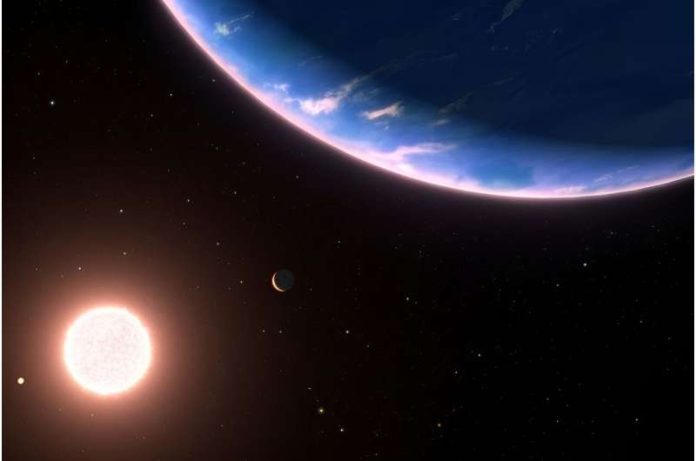
Using the James Webb Space Telescope (JWST), an international team led by Canadian scientists has discovered fascinating new details about the atmosphere of GJ 9827 d, an exoplanet orbiting a star 98 light-years away in the constellation Pisces.
This small planet has a unique, water-rich atmosphere, leading astronomers to believe it may be a “steam world.”
GJ 9827 d is roughly twice the size of Earth, making it one of the smallest exoplanets with a confirmed atmosphere.
The new study, published in The Astrophysical Journal Letters, was led by Caroline Piaulet-Ghorayeb, a Ph.D. student at the Université de Montréal’s Trottier Institute for Research on Exoplanets (IREx), and involved researchers from around the globe.
They combined data from the JWST and the Hubble Space Telescope (HST) to analyze the planet’s atmosphere in great detail.
What makes GJ 9827 d stand out is that its atmosphere is rich in heavier molecules, including a significant amount of water vapor.
This differs from larger planets like gas giants, whose atmospheres are mostly made of lighter hydrogen.
The discovery is groundbreaking because it marks the first time an exoplanet’s atmosphere has been found to contain more of these heavier molecules rather than hydrogen.
Scientists detected the water vapor in GJ 9827 d’s atmosphere by using transmission spectroscopy.
This method measures how the planet’s atmosphere absorbs starlight when the planet passes in front of its star.
With the advanced capabilities of JWST’s Near-Infrared Imager and Slitless Spectrograph (NIRISS), the team could clearly distinguish that the observed features came from the planet’s atmosphere, not from its star.
The discovery of GJ 9827 d’s steam-filled atmosphere provides an exciting glimpse into a new type of planet. Though the planet itself is not habitable due to its high surface temperatures (about 350°C) and close distance to its star, this finding is a big step toward detecting atmospheres around smaller, rocky planets like Earth. The presence of water vapor and heavier molecules hints that other, more habitable planets with similar atmospheres might exist in the universe.
Piaulet-Ghorayeb noted that while GJ 9827 d is not likely to support life, its atmosphere offers proof that small planets with water-rich atmospheres can be studied with precision. The study of GJ 9827 d, a “steam world” where water exists as vapor rather than liquid or ice, opens the door to further discoveries that could bring scientists closer to finding Earth-like planets capable of supporting life.
Astronomers plan to continue observing GJ 9827 d with the JWST in the coming months to learn more about the components of its atmosphere.



